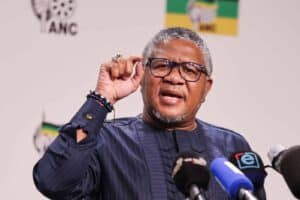Mashatile says the party with the biggest share of the vote should be allowed to lead.

There is an urgent need for a “national dialogue” in order to address the instability caused by coalition governments across many municipalities in the country.
This is according to Deputy President Paul Mashatile, who was answering oral questions in the National Assembly on Thursday.
There has been a great deal of debate about a possible coalition government ahead of the 2024 general elections, raising questions on whether political parties would be able to find each other in policy terms.
Legal framework
Mashatile was asked by Democratic Alliance (DA) chief whip Siviwe Gwarube during the Q&A session about whether would he support the party’s private member’s bill in the absence of an existing legal framework to stabilise coalitions.
The deputy president, in his response, admitted that the existing laws had weaknesses and highlighted that the South African Local Government Association (Salga) had previously developed a framework on coalitions.
“The matter of coalition governments is important and requires urgent attention and our collective wisdom,” Mashatile said on Thursday.
ALSO READ: Legislation and national debate urgently needed to deal with coalition chaos
He said the party with the biggest share of the vote should be allowed to lead.
“The party that has won the largest votes in an election should be allowed to lead a coalition and executive positions should be allocated proportionally to the votes obtained by the coalition partners.”
This would be the foundation to create stability in coalitions, according to Mashatile.
“The above-mentioned principle will then constitute the basis of the discussion at the national level, engaging in that dialogue where we can then come to an agreement on a national framework. We want to do this honourable members within the next two months. We are taking into account that there are elections next year so we don’t want to delay it.”
Watch the plenary below:
The deputy president called on various political parties to be involved in the process of coming up with a national framework.
“Working with the Minister of Co-operative Governance and Traditional Affairs [Cogta], we will be inviting all political parties represented in Parliament to the dialogue on the principle of coalition government across all the spheres of government while we urgently attending to the issue of dysfunctionality of municipalities as a result of current, loosely arranged coalitions, particularly as we can see in local government.
“All the parties will start to be asked to make inputs and views to the technical committee led by the Presidency and Cogta to help develop a framework for coalition government which will consequently lead to the development of legislation.
“We want to build consensus because if we don’t work together as political parties, we will fail our people, and our economy will collapse.”
Outright win
Mashatile added that although the African National Congress (ANC) did not favour coalitions and was seeking an outright majority win, but he conceded that it was necessary for the governing party to be prepared to face a reality of government coalitions.
“We are saying that in the event where we end up not winning outright, then we are looking at what kind of approach do we take. If we are going into coalitions, how should they look?”
The ANC has been tipped to drop below 50% in next year’s elections.
The DA has since proposed a “moonshot pact” for smaller parties to come together to prevent the ANC and the Economic Freedom Fighters (EFF) from forming a coalition at the national level.
NOW READ: Will ANC-EFF coalition fast-track Malema’s ambitions to be head of state in 2029?
Support Local Journalism
Add The Citizen as a Preferred Source on Google and follow us on Google News to see more of our trusted reporting in Google News and Top Stories.






